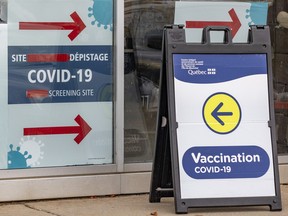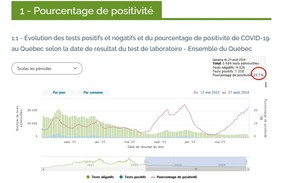The disease has killed 34 Quebecers in their 50s in the past 12 months, and nine in their 40s.

Article content
Quebec’s summer COVID-19 wave has proved to be far deadlier than last year’s, defying expectations that the virus that causes it is somehow growing milder, suggest the latest Health Ministry figures.
As the KP.3.1.1. variant has become predominant in Quebec, as is the case elsewhere in North America, the province recorded 117 deaths linked to COVID-19 for the month of August (as of Aug. 24), compared with 88 such fatalities for the whole month last year. In July, there were 109 deaths compared with 46 for the same month in 2023.
Advertisement 2
Story continues below
Article content
Preliminary research has shown that although the KP.3.1.1 strain is not more virulent than previous variants, it is more contagious. In Quebec, this is reflected in the fact that the positivity rate among those tested for COVID-19 is now 23.7 per cent, the highest it’s been since the winter resurgence of December 2023.

In addition, Quebec declared a total of 1,322 hospitalizations with and for COVID-19 as of Aug. 27, compared with 985 hospitalizations on the corresponding date last year. The province was also battling outbreaks in 159 long-term care centres and hospitals as of Aug. 19 (the most recent date available), in contrast with fewer than a hundred on the same date last year.
“I think those numbers are concerning,” said Dr. Donald Vinh, an infectious diseases specialist at the McGill University Health Centre. “First, SARS-COV2 (the virus that causes COVID) is still circulating. Secondly, there clearly remain many people at risk for severe disease.”
More Quebecers in their 80s died from COVID-19, followed by those in their 90s, the numbers show. However, the multi-system disease has also killed people in younger age groups, including 34 in their 50s, nine in their 40s and one in their 30s, according to Quebec’s public health institute. (Those figures run from Aug. 27 last year to the same date this year.)
Article content
Advertisement 3
Story continues below
Article content
“The virus is not becoming more benign,” Vinh explained. “Some had proposed that the virus would become somehow attenuated as it propagated through human populations, which is a notion that is erroneously extrapolated by what is seen in certain settings, where a microbe can be passaged in cells, and over many passages/generations, a weaker version could be appear. That doesn’t work in humans because humans are not single-celled organisms in a test tube, and humans very much can get sick in the process of propagation/passaging as the mortality rates would suggest.”
Despite the higher COVID-19 summer mortality rates in Quebec this year, more people died from the disease in the months of July and August of 2022, when Omicron subvariants first swept the province. But the latest figures nonetheless do not augur well for the the fall season as more people head indoors and the school season resumes.
Just last week, the Laval health authority re-introduced masks for employees and patients in its health facilities. However, a spokesperson for the Health Ministry told The Gazette the government is not planning any new public-health measures.
Advertisement 4
Story continues below
Article content
“In the context of the back-to-school period, the (Health Ministry) continues to monitor the epidemiological situation of COVID-19 closely,” Francis Martel said in an email. “Although this no longer requires the emergency health measures that were in place at the time of the pandemic (such as isolation measures or travel restrictions, for example), individual actions to prevent the transmission of infections remain important.”
Meanwhile, Health Canada is reviewing submissions by Pfizer and Moderna for updated vaccines that target the KP.2 variant. Although not an exact match for KP.3.1.1, those shots should nonetheless provide protection against severe disease that may be caused by the latest variants. In July, Quebec’s immunization committee released its COVID-19 vaccine guidelines, recommending the shots for people who are at least 60; those living in long-term care homes; people who are living with chronic illnesses; those who are pregnant; and health-care workers.
Recommended from Editorial
Advertisement 5
Story continues below
Article content
Article content


Comments